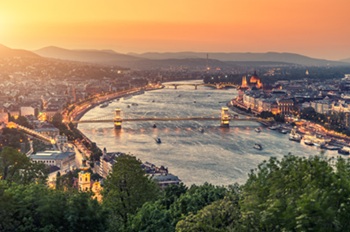Is it Safe to Travel to India?
Wondering if it’s safe to travel to India? Learn how to prepare, stay aware, and enjoy India’s diverse landscapes and rich cultural heritage.
Is India A Safe Country For Travel?
India – the place where you find hues that pop, flavors that zing, and scenery that takes your breath away. But amid its lively streets and diverse traditions, there's one big question on every traveler's mind: Is it safe to travel to India?
While India doesn't rank very high on the 2024 Global Peace Index safety rankings, it has improved its position from the previous year. However, the US State Department advises that travelers should exercise increased caution under a level-2 rating. You may need to avoid visiting restricted or protected areas and stay aware while exploring the major cities or visiting tourist sites in India.
The rankings might lead you to believe that India isn't the first choice for globetrotters, but by carefully selecting your destinations and remaining vigilant, you'll uncover a country brimming with a profound history and genuine hospitality. Here’s everything you need to know about traveling to India safely.
What are some safe travel practices in India?
AXA travel insurance keeps your safety at the forefront. We know that embarking on a journey to a new destination like India can be both exhilarating and a tad nerve-wracking. These general safety tips will help you navigate your Indian adventure with confidence.
-
Stay Informed: Before you jet off, take some time to research your destination. Familiarize yourself with the local customs, culture, and any potential safety concerns, especially regarding border regions or restricted or protected areas. Keep an eye on local media for updates on civil unrest, natural disasters, or extreme weather events like the monsoon season or dust storms, which may arise with little or no warning. Have knowledge of the legal drinking age and alcohol laws in India, as they can vary by region. Also, stay informed about any potential health risks, including food safety concerns.
-
Keep Copies of Important Documents: Make photocopies or digital scans of your passport, travel insurance, and other important documents like your international driving permit. Store them securely and keep the originals separate from your copies to mitigate risks like petty theft. Also, consider getting a travel protection plan for your trip, as it will cover you for unforeseen situations like luggage loss or delay, trip delays, and any other circumstances.
-
Stay Connected: Share your travel itinerary with a trusted friend or family member back home. If you're traveling to rural or forested areas, seek local advice and let your contact know your plans. Stay in touch regularly and let them know of any changes to your plans.
-
Blend In: While it's natural to stand out as a foreigner in a new land, try to dress and behave in a way that respects local traditions. Avoid flashy jewelry or clothing that may attract unwanted attention, especially in crowded areas like tourist sites or places of national significance.
-
Stay Aware of Your Surroundings: Be mindful of your surroundings, especially in crowded or unfamiliar areas, public transport, or visiting religious sites. Keep an eye on your belongings and stay vigilant against pickpockets or scam artists.
-
Stay Safe with STEP: If you're an American gearing up for a trip overseas, think about hopping on board with STEP, the Smart Traveler Enrollment Program, brought to you by the U.S. Department of State. When you enroll, you'll receive key updates from the U.S. Embassy or Consulate in your destination about any possible hazards, including changes to internet services, incidents at military sites, or heightened risks near the border areas. And in case things take a turn while you're adventuring, STEP can assist the Embassy or Consulate in locating you and offering the necessary support to keep you out of harm's way. Sign up right here.
What are the Necessary Vaccinations for Travel to India?
When asking if it is safe to travel to India, one aspect to consider is staying healthy throughout your journey. India doesn't require any specific vaccines, but the World Health Organization advises travelers to have their routine vaccinations up to date when visiting. These vaccinations can differ depending on the individual, so it's wise to chat with your doctor at least 4–6 weeks before your India trip. This way, you'll have enough time to take care of any necessary vaccinations.
General Considerations: Visit the Centers for Disease Control and Prevention (CDC) travel website for the latest updates on infectious diseases in India. Before heading to India, make sure you're updated on your routine vaccinations. These include protection against diseases like chickenpox, diphtheria, tetanus, pertussis, flu, measles, mumps, rubella, polio, shingles, hepatitis A, hepatitis B, typhoid, and malaria.
If you have pre-existing medical conditions, discuss how to manage them while traveling. Food safety is critical, so vaccinations for typhoid and hepatitis A are especially important if you plan to try street food in crowded or rural areas.
COVID-19 Considerations: Travelers no longer need a COVID-19 vaccine or a negative test result to visit India. While it's not required to be fully vaccinated for travel, it's strongly advised for international trips. Additionally, filling out the Self Declaration Form for India is no longer mandatory, as it was during the COVID-19 pandemic.
Region-Specific Vaccines: Consider getting the cholera vaccine if you're heading to areas with active cholera transmission. For those venturing into rural areas, going hiking, or camping, it's wise to look into vaccines for Japanese encephalitis and rabies. Travelers venturing into remote regions or border areas should seek local advice and ensure they have the necessary vaccinations to minimize risks from animal bites or mosquito-borne illnesses.
What are the Dangers, Threats, and Alerts in India?
While India offers an array of cultural wonders, like any destination, it's not without its challenges. Know the unsafe areas announced by the Indian government. This will help you to understand the potential dangers and can help travelers navigate their Indian adventure with confidence.
-
Petty Crime: You may find petty crimes like pickpocketing, especially in major cities and tourist areas. Stay alert in crowded areas, avoid carrying large amounts of cash, and keep your belongings secure, including passports. Public transportation and overnight trains are common targets for theft. Be cautious, keep your belongings close, and lock doors securely. While serious crimes against foreigners are less common, it's essential to remain vigilant. If you encounter theft, report it promptly at the nearest police station and obtain a police report for travel insurance purposes.
-
Terrorism: Terrorist attacks may pose a threat in some parts of India, notably in Jammu and Kashmir, Manipur, Assam, and regions with active Naxalite groups. Naxalites may primarily target government and security forces, occasionally affecting public transportation. While tourists aren't usually targets, vigilance is crucial, especially during elections, religious holidays, and national events. Monitor local media for any information or instructions from the Indian authorities.
-
Fraud: Watch out for credit card and ATM fraud while traveling. Take care when using your debit or credit cards: be vigilant when others handle your cards, choose ATMs in well-lit areas or inside reputable establishments, avoid suspicious card readers, cover your PIN when entering it, and regularly check your account statements for any unauthorized transactions.
-
Women’s Safety: You may find crimes against women in India, and foreign women may face unwanted attention in certain areas. To stay safe, avoid traveling alone, especially at night, and be extra cautious on public transportation and in auto-rickshaws or taxis. Trust reputable and professional guides and registered tour operators to ensure safety.
-
Scams: While India is a beautiful country to explore, you need to be cautious in popular tourist spots and airports where scammers often prey on visitors. Some may try to lure you into schemes involving expensive goods like jewels or carpets. Even if it sounds tempting, avoid any unsolicited offers, whether for cheap rides, accommodations, or guided tours. Stay alert and trust your instincts to avoid falling victim to these scams. Seek help from local police in case you face any such scam.
-
Road Safety: Road conditions and safety may pose significant concerns in rural India. Sometimes, you may face accidents or roadblocks during the rainy seasons in the hilly areas due to natural calamities. In such cases, it’s important to be aware of the availability of commercial mountain rescue services that may assist in emergencies. So, beware of any unexpected obstacles, both in urban and rural streets, and know whom to contact for assistance in such situations.
What Places Should I Avoid in India?
While India boasts several captivating destinations, there are a few areas travelers may want to exercise caution and consider avoiding. For those wondering if is it safe to travel to India, the answer lies in staying informed and making mindful choices. As per the India travel advisory by the US government, there are some areas that you need to avoid visiting due to the high risk of personal security.
Jammu and Kashmir
In the union territory of Jammu and Kashmir, there's a risk of terrorist attacks and violent unrest. It's suggested to avoid travel to sensitive areas of the UT, except for visits to the eastern Ladakh region and its capital, Leh. Better visit with a tour operator as they will guide you to visit the safer areas of the UT.
Northeastern States
In the northeast, you may hear about occasional violence by ethnic insurgent groups can happen. Monitor local media and news to get guidance on which regions are safer to visit when you are traveling to Northeastern India.
India-Pakistan Border
Both India and Pakistan have strong military presence along their border. The official crossing point for non-citizens is in Northern India between Attari, India, and Wagah, Pakistan. Check the border status before traveling.
Central and East India
Maoist extremist groups, known as “Naxalites,” are active in rural and forested areas across some states. They frequently target local authorities and government officials.
Wrapping Up
While India is a beautiful and diverse country with much to offer, it's important to stay informed and cautious while traveling. By taking necessary precautions, staying aware of your surroundings, and respecting local customs, you can have a safe and memorable experience exploring the wonders of India.

Travel Assistance Wherever, Whenever
Speak with one of our licensed representatives or our 24/7 multilingual insurance advisors to find the coverage you need for your next trip. Contact Here



